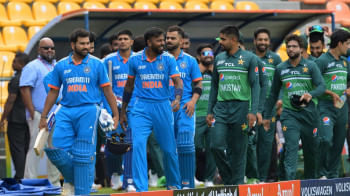Beyond borders, brawls and bragging

Social media, with its ability to connect people across borders instantly, has undoubtedly changed the way countries interact on an interpersonal level. In South Asia, where historical narratives and cultural intertwinements are deeply rooted, the role of social media becomes even more pronounced. West Bengal and Bangladesh, sharing the Bengali language, similar cultural practices, and historical experiences, often find themselves at odds on social media over issues that, at first glance, may appear trivial. However, these disputes often stem from a deep sense of pride and identity, rather than any significant political or religious discord.
The competitive nature of cricket, a sport revered in both India and Bangladesh, serves as a prime example of how social media can turn friendly rivalry into heated exchanges. The passion for the game, coupled with national pride, frequently leads to clashes on platforms like X (formerly Twitter) and Facebook. During major tournaments social media becomes a battleground where fans from both countries express their fervours. The 2023 ICC Men's Cricket World Cup final, where Australia defeated India, saw a surge in online activity from Bangladeshi fans supporting Australia. Indian fans interpreted this support as a slight against their nation, further fuelling the social media conflict.
Yet, these conflicts on social media are not indicative of a deep-seated animosity based on politics or religion. On the contrary, a 2023 survey have shown that Bangladeshi youth largely separate their sports preferences from their religious beliefs. The support for a cricket team is more influenced by the team's performance and the behaviour of its players rather than any religious doctrine. This highlights that the primary drivers of these social media disputes are competitive sportsmanship and national pride, not religious differences.
Another aspect that fuels these social media conflicts is the superior mentality often displayed by larger nations. In the context of South Asia, larger countries like India can sometimes be perceived as having a patronising attitude towards their smaller neighbours. This perception can exacerbate tensions and lead to defensive reactions from the smaller countries. On social media, this dynamic is often magnified, leading to more frequent and intense disputes.
To improve social media diplomacy and reduce conflicts, it is essential to establish clear guidelines for diplomatic communication on these platforms. Encouraging the use of social media for positive engagement, such as sharing cultural exchanges and collaborative initiatives, can help foster better relations. Developing crisis management protocols for promptly addressing disputes and misunderstandings on social media is also vital. Educational campaigns that promote cultural understanding and tolerance, focusing on the shared history and values between neighbouring countries, can play a significant role in mitigating conflicts.
Furthermore, joint social media initiatives that highlight the positive aspects of bilateral relationships can help bridge the gap between nations. Cross-cultural training for diplomatic staff on sensitivities and effective communication on social media can ensure that these platforms are used to build bridges rather than barriers. By implementing these strategies, countries can leverage the positive aspects of social media to strengthen diplomatic ties and foster a more harmonious relationship between neighbouring nations.
Social media is a powerful tool that has both positive and negative impacts on international relationships. In the case of India and Bangladesh, while it has the potential to exacerbate conflicts, it also offers opportunities for fostering better understanding and cooperation. By focusing on shared cultural ties and addressing the underlying causes of social media disputes, South Asian countries can work towards more stable and amicable relationships. The emphasis should be on promoting positive engagement and managing conflicts constructively, ensuring that social media serves as a bridge rather than a barrier between nations.
Pranto Chatterjee is a former Indian Council for Cultural Relations (ICCR) scholar.
Views expressed in this article are the author's own.
Follow The Daily Star Opinion on Facebook for the latest opinions, commentaries and analyses by experts and professionals. To contribute your article or letter to The Daily Star Opinion, see our guidelines for submission.

 For all latest news, follow The Daily Star's Google News channel.
For all latest news, follow The Daily Star's Google News channel. 





Comments